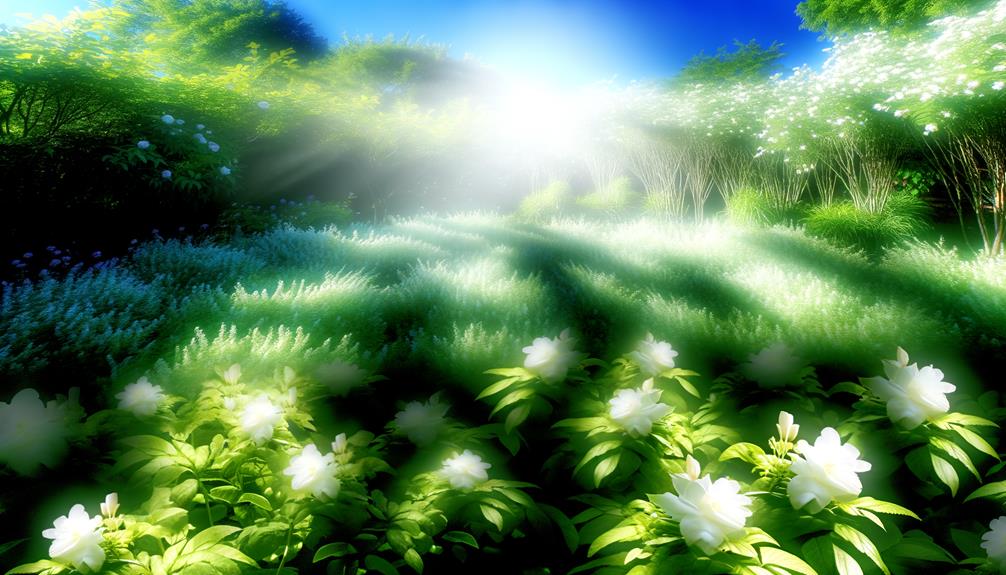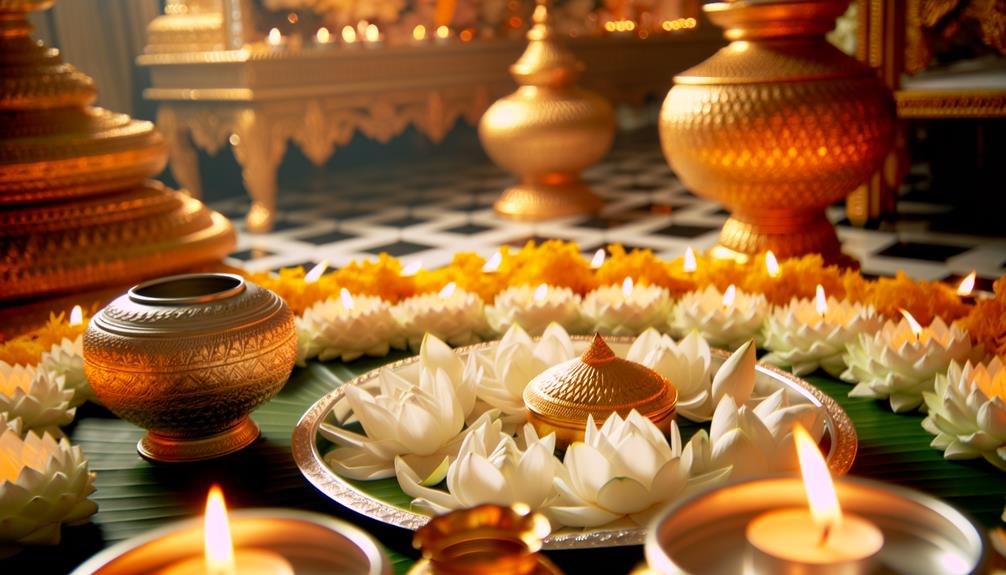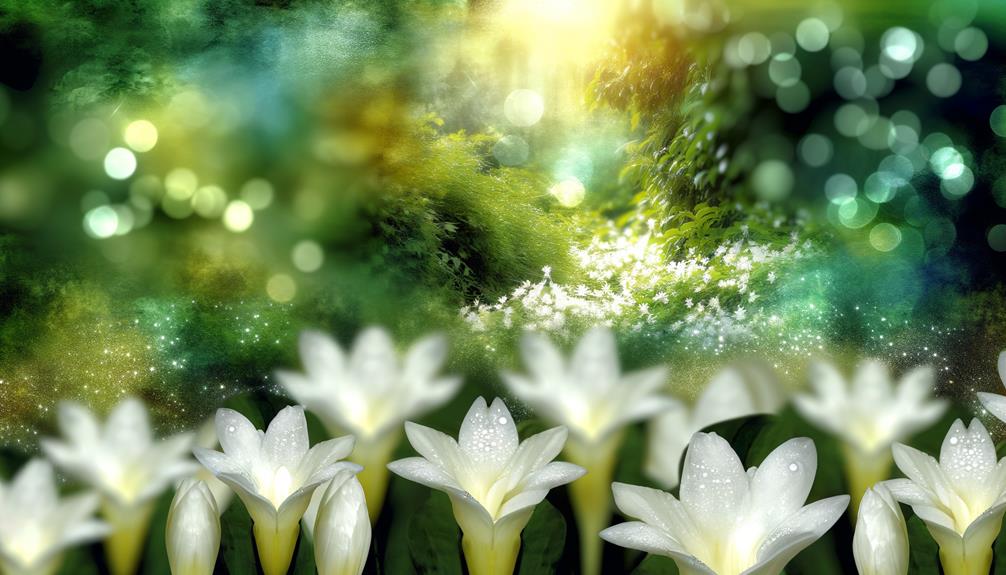Spiritual Meaning of White Flowers: Innocence and Spirit
White flowers hold profound spiritual significance, representing purity, innocence, and divine connection across various cultures. They symbolize new beginnings and are revered in significant life events like weddings and funerals.
In ancient societies, white blooms were seen as sacred, reflecting spiritual and emotional purity. In Christianity, they embody the divine light and resurrection, while in Buddhism and Hinduism, they signify enlightenment and transcendence.
Furthermore, their tranquil presence is believed to support emotional balance and mental clarity, fostering a peaceful environment for reflection and meditation. Embrace their symbolism to explore a serene and harmonious spiritual journey.

Spiritual Meaning of White Flowers: Purity, Peace, and Spiritual Awakening
| Aspect | Spiritual Insight |
|---|---|
| Purity and Innocence | Represents a clean heart and untainted soul |
| Peace and Serenity | Brings calmness, healing, and emotional clarity |
| Spiritual Awakening | Signifies enlightenment and connection to higher realms |
| Divine Presence | Symbol of angelic guidance and divine love |
| New Beginnings | Often associated with rebirth and fresh starts on a spiritual path |
Symbolism in Ancient Cultures

Throughout history, white flowers have held profound symbolic significance in various ancient cultures, often representing purity, innocence, and the divine.
In ancient Egypt, white lilies were intertwined with the rituals surrounding the goddess Isis, embodying resurrection and eternal life. Similarly, in ancient Greece, the white lily was sacred to Hera, symbolizing motherhood and rebirth.
In Asian traditions, white flowers such as the lotus are revered for their spiritual purity and enlightenment, emerging untainted from muddy waters.
Indigenous cultures in the Americas often used white blooms in ceremonies to honor the sacred and invoke blessings.
These diverse yet harmonious interpretations underscore a universal reverence for white flowers, inviting us to reflect on their timeless, cross-cultural resonance in human spirituality.
Purity and Innocence
White flowers, often celebrated for their pristine beauty, evoke profound symbolism of purity and innocence across various cultures and spiritual traditions. Their unblemished hue serves as a powerful metaphor for untouched virtue and simplicity.
White flowers are frequently associated with new beginnings and are chosen for significant life events that emphasize purity.
Consider the following:
- Weddings: White flowers, such as lilies and roses, symbolize the purity of love and the start of a new chapter.
- Funerals: They represent the innocence of the departed soul, offering a sense of peace and serenity.
- Spiritual Ceremonies: Used in rituals to invoke purity and divine blessings.
Reflecting on white flowers encourages us to appreciate the untainted beauty and innocence they symbolize, inspiring a deeper understanding of their spiritual significance.
White Flowers in Christianity

How do white flowers embody profound symbolic meanings within Christian traditions and beliefs?
In Christianity, white flowers are often seen as emblems of purity, innocence, and divine light. They symbolize the Virgin Mary, whose purity and grace are central to Christian teachings.
White lilies, in particular, are frequently associated with Easter, representing the resurrection of Jesus Christ and the promise of eternal life. The ethereal beauty of these flowers serves as a reminder of the heavenly, encouraging believers to endeavor for spiritual cleanliness and moral integrity.
In church ceremonies, white flowers adorn altars and sanctuaries, creating an atmosphere of solemn reverence and spiritual elevation. They embody the essence of Christian faith: a journey towards purity and divine truth.
Significance in Buddhism
While white flowers play a significant role in Christian symbolism, they also hold deep spiritual meaning within Buddhist traditions.
White flowers, particularly the lotus, symbolize purity and enlightenment. Their serene beauty serves as a reminder of the journey toward spiritual awakening and the transcendence of worldly desires.
In Buddhism, white flowers are revered for three primary reasons:
- Purity: Representing the purity of mind and heart, free from the stains of ignorance and attachment.
- Enlightenment: Symbolizing the ultimate goal of enlightenment, akin to a lotus rising unstained from muddy waters.
- Compassion: Reflecting the compassionate nature of the Buddha, who guides others toward the path of liberation.
Thus, white flowers in Buddhism are more than mere botanical specimens; they are profound spiritual symbols.
Hindu Rituals and White Blooms

In Hindu rituals, white flowers hold profound significance, symbolizing purity and spiritual transcendence.
Often used in offerings and sacred ceremonies, these blooms embody the essence of devotion and reverence towards deities.
Their presence in rituals reflects the timeless tradition of seeking divine blessings and enlightenment.
Symbolism in Hindu Ceremonies
Deeply woven into the tapestry of Hindu rituals, white flowers symbolize purity, peace, and spiritual enlightenment. These delicate blooms are more than mere decorations; they embody sacred meanings that enhance the sanctity of various ceremonies.
Their significance is reflected in:
- Worship: White flowers are often offered to deities as a symbol of the devotee’s pure intentions and reverence.
- Marriage: In Hindu weddings, they represent the purity and harmony of the marital union.
- Festivals: During festivals, white flowers are used to adorn altars and homes, invoking peace and divine blessings.
These rituals underscore the deep connection between nature and spirituality, reminding participants of the beauty and purity that pervade every facet of life.
Offerings and Sacred Traditions
Throughout Hindu rituals, the offering of white flowers stands as a profound symbol to the devotee’s quest for spiritual purity and enlightenment. These pristine blooms are frequently used in various ceremonies, representing the purity of heart and mind essential for spiritual growth. White flowers, such as jasmine and lotus, are believed to invoke blessings, peace, and divine presence.
| Flower | Symbolism | Common Rituals |
|---|---|---|
| Jasmine | Purity and Devotion | Weddings, Puja ceremonies |
| Lotus | Spiritual Awakening | Temples, Religious festivals |
| Frangipani | Immortality and Grace | Funerals, Memorial offerings |
These sacred traditions reflect a deeper understanding of life’s transient nature, encouraging devotees to aspire towards higher spiritual ideals. The simplicity and elegance of white flowers encapsulate the essence of divine beauty and transcendence.
White Flowers in Funerary Practices
Across various cultures, white flowers hold a significant place in funerary practices, symbolizing purity and the soul’s peaceful passage.
Their presence in mourning rituals serves as a poignant reminder of the departed’s innocence and the hope for eternal serenity.
As tokens of remembrance, these blooms offer comfort and a sense of spiritual continuity to those grieving their loss.
Symbolism in Mourning Rituals
White flowers, often seen as symbols of purity and peace, hold a profound place in mourning rituals, offering solace and conveying respect for the departed.
Their understated elegance provides a gentle reminder of life’s transient nature and the enduring beauty of the spirit.
White flowers play a significant role in funerary practices through:
- Symbolizing Eternal Rest: Their serene hue represents the peaceful eternal rest of the departed soul.
- Conveying Sympathy: They offer a heartfelt expression of sympathy and support to grieving families.
- Representing New Beginnings: White flowers embody the hope of spiritual rebirth and renewal.
These delicate blooms serve as a poignant tribute, reflecting the purity of the departed’s journey and the collective wish for their serene passage into the afterlife.
Purity and Remembrance
In funerary practices, the pristine allure of white flowers evokes a sense of purity and serves as a poignant symbol of remembrance for the departed. Their serene presence provides solace, reflecting the untainted essence of the soul progressing to eternity.
White flowers such as lilies, roses, and chrysanthemums are frequently chosen for memorial services, embodying the virtues of innocence and eternal peace. This tradition transcends cultural boundaries, reaffirming a universal desire to honor and remember loved ones with dignity and grace.
| Flower | Symbolism | Occasion |
|---|---|---|
| White Lilies | Purity, Rebirth | Funerals, Memorial Services |
| White Roses | Remembrance, Respect | Funeral Wreaths |
| White Chrysanthemums | Eternity, Truth | Grave Decorations |
| White Carnations | Innocence, Love | Memorial Bouquets |
Such choices are an indication of the enduring connection between purity and remembrance in the circle of life and death.
Peace and Tranquility

Embodying a sense of serene calm, white flowers have long been symbols of peace and tranquility in various cultures. Their delicate petals and soothing hues create an ambiance of quiet reflection, fostering an environment conducive to inner stillness.
The spiritual significance of white flowers can be observed in:
- Meditation Practices: White flowers are often used to enhance meditation spaces, aiding in the attainment of a peaceful mind.
- Ceremonial Uses: They grace many ceremonies, symbolizing a wish for serenity and harmonious beginnings.
- Healing Rituals: White flowers are integral to rituals aimed at emotional healing, providing solace and comfort.
Their presence invites a moment of pause, offering a gentle reminder of the tranquility that lies within us all.
Divine Connection
Serving as a bridge between the earthly and the ethereal, white flowers are often viewed as conduits for divine connection. Their pure, unblemished petals symbolize spiritual awakening and enlightenment, inviting a sense of closeness with the divine. White flowers are frequently used in sacred rituals and ceremonies to invoke higher energies and foster a serene, meditative atmosphere.
| Flower Type | Symbolism | Usage in Rituals |
|---|---|---|
| White Lily | Purity and Renewal | Weddings, Funerals |
| White Rose | Divine Love and Grace | Religious Altars |
| White Lotus | Spiritual Enlightenment | Meditation Spaces |
These blossoms serve as gentle reminders of our innate connection to the divine, encouraging introspection and spiritual growth.
Healing Properties

The healing properties of white flowers extend beyond their enchanting beauty, offering profound support for emotional balance, relief from physical ailments, and enhanced mental clarity.
These delicate blooms serve as gentle reminders of nature’s capacity to nurture and heal.
Emotional Balance Support
White flowers, with their serene and pure appearance, are often believed to possess healing properties that foster emotional balance and tranquility. The gentle aura of these blossoms can play an essential role in alleviating emotional turbulence and nurturing inner peace.
Here are three ways white flowers support emotional balance:
- Calming Influence: Their soft hues and delicate structure evoke a sense of calm, reducing stress and anxiety.
- Symbol of Purity: Representing purity and innocence, they help cleanse the mind of negative emotions.
- Meditative Aid: Incorporating white flowers into meditation spaces can enhance mindfulness, aiding in emotional stabilization.
Reflecting on the ethereal beauty of white flowers can inspire a deeper connection to one’s emotional well-being, fostering a harmonious inner state.
Physical Ailment Relief
Often revered for their therapeutic benefits, white flowers have been traditionally used to alleviate various physical ailments through their natural healing properties.
Historical records highlight their use in herbal medicine, where white blossoms such as chamomile and jasmine have been esteemed for their anti-inflammatory and analgesic effects.
Chamomile, for instance, is celebrated for soothing digestive issues and promoting restful sleep, while jasmine oil is known to relieve muscle spasms and improve skin health.
The purity and simplicity of white flowers extend beyond their visual appeal, embodying a gentle yet potent force for physical healing.
Reflecting on these ancient practices, we find a harmonious connection between nature’s gifts and our well-being, offering a holistic approach to health and recovery.
Mental Clarity Enhancement
Beyond their physical healing properties, white flowers also possess an extraordinary ability to enhance mental clarity and focus. Their pure, unblemished appearance acts as a visual cue for the mind, encouraging serenity and calm. These delicate blooms serve as a gentle reminder to clear mental clutter and embrace simplicity.
Here are three ways white flowers can enhance mental clarity:
- Visual Meditation: Gazing upon white flowers can act as a focal point during meditation, helping to quiet the mind.
- Aromatherapy: The subtle fragrance of white flowers, such as jasmine or gardenia, can uplift the spirit and sharpen cognitive functions.
- Symbolic Purity: White flowers symbolize purity and new beginnings, encouraging a refreshed and focused mental state.
This simple yet profound influence cultivates mental clarity and emotional equilibrium.
White Flowers in Modern Spirituality
In contemporary spiritual practices, the purity symbolized by white flowers frequently serves as a conduit for inner peace and transcendental connection. These delicate blooms are often incorporated into various rituals and meditative spaces to foster an environment of serenity and spiritual clarity. White flowers are seen as a bridge between the earthly and the divine, facilitating a deeper communion with one’s higher self.
| Aspect | Meaning | Practice |
|---|---|---|
| Purity | Unblemished spirit | Meditation aids |
| Serenity | Calmness of mind | Altar adornments |
| Transcendence | Connection to the divine | Ritualistic offerings |
In this reflective journey, white flowers stand as timeless symbols, guiding seekers toward a heightened spiritual awareness and a harmonious existence.
Conclusion
The spiritual significance of white flowers transcends cultural and temporal boundaries, encapsulating ideals of purity, innocence, peace, and divine connection.
Critics may argue that these interpretations are subjective and culturally constructed.
However, the consistent reverence for white flowers across diverse spiritual traditions underscores a universal human inclination towards symbols of transcendence and healing.
Such enduring symbolism invites reflection on the shared quest for spiritual elevation and the profound connections that bind humanity to the natural world.






